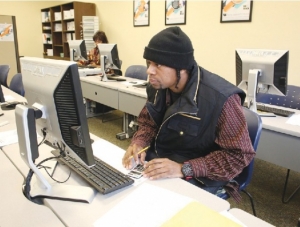A ready workforce
By Kirsten Ballard
Published in News on March 6, 2015 1:46 PM

News-Argus/CASEY MOZINGO
Linda Berard works on her computer at her desk in the Wayne Business and Industry Center at Wayne Community College. Mrs. Berard is an administrative assistant who was hired for the job after completing the National Career Readiness Certification program and receiving a silver certificate.

News-Argus/CASEY MOZINGO
Omeara Davis takes a practice test for the National Career Readiness Certification.
Linda Berard was ready to go back to work.
In 2010, she was laid off from her job of 13 years.
In November, the unemployment office wanted her to prove she was ready and capable of working. It was simple; she had to take a three-part test to assess her working skills.
She studied for a week before taking the National Career Readiness Certification test.
"Any testing is nerve-wracking," she says. So she went to the lab to practice the skills and concepts she would be tested on.
Now, she works full-time as the administrative assistant for the Wayne Business and Industry Center.
"This is the best job," she says. "I got a silver, and that gave me my job here."
The Wayne Business and Industry Center at Wayne Community College is building a skilled workforce with the hopes of building a community.
In 2013, the county was awarded the first Work Ready Community designation.
This achievement was determined by the number of work-ready certified workers, graduation rate and community leader commitment to workforce excellence.
In 2014, the county reached 100 percent of the goals set national standard of a work ready community.
According to Diane Ivey, executive director of the Wayne Business and Industry Center, this is a huge accomplishment.
"It's like a chicken or the egg thing," she says.
"If you want companies to come to your community, you have to have good, qualified workers. To get people to understand they need good qualifications, you have to have good employers and good jobs."
The center offers tests to certify work readiness.
Through quantitative data, the National Career Readiness Certification tests have found a way to measure a person's work readiness.
It is based on the ACT WorkKeys, a set of work-based assessments that measure both hard and soft working skills.
The NCRC program focuses on measuring a person's ability to read for information, to gather information and to apply math skills.
"You need those to be successful pretty much whatever work you do," Mrs. Ivey says.
In Wayne County, nearly 25 percent of the work force has been certified. This is the highest number of certifications in North Carolina.
Jobs are profiled to see what proficiency of skills candidates need to have to realistically complete the job. The NCRC gives employers and potential employees clear standards and expectations of what is needed to do the job correctly.
The tests results are presented in a certificate with levels that are distinguished by bronze, silver, gold and platinum.
"Less than 1 percent of jobs require platinum level," Mrs. Ivey says.
High school students in the county take the certification during junior year. Upon graduation, they will have both a diploma and certification showing their skill level. It is an additional qualifier on the resume to give depth and credit to the young person's ability to perform a job.
Mrs. Ivey does not want NCRC to become the only criteria employers rely on in the hiring process, instead it is an additional tool for them to use.
"There are a lot of factors that go into whether a person will be a good employee," she says.
The college offers a lab six times per week where people can learn and practice the concepts they are tested on. The instructor-facilitated lab allows for self-paced learning. It is offered through Human Resource Development and, with proof of unemployment or if a person meets income guidelines, there is no fee for the lab.
"It helps people prove their job ready," Mrs. Ivey says. "It shows an employer that you are able to learn, willing to learn, and hopefully, willing to work."
The tests last 50 minutes and cost $10 per test. The results are national and transfer between states.
They are administered on a computer, although Mrs. Ivey says the computer skills required are standard clicking and scrolling.
After all three tests are completed, the participant is designated a skill level. Scores can be posted online or listed on resumes.
With the certificate, people can job hunt within their skill bracket. A bronze certificate holder is able to assess entry level jobs realistically and compare their skill level to those holding a job.
The Center has a list of community businesses that use the NCRC scores as part of the hiring process. Some businesses, such as health care professionals, do not recognize the NCRC but in the next year, Mrs. Ivey says they hope to reach out to more small businesses and employers to evaluate the hiring needs and processes.
Starting in December, the Wayne Business and Industry Center partnered with Southern Wayne High School for a pilot program that teaches and evaluate soft skills.
"We've given them a way to define what's expected," Mrs. Ivey says.
The rubric measures "citizenship" skills like communication, preparedness and other non-technical skills. These soft skills are traditionally very subjective, so the center created a measurable set of expectations. The rubric is used at the college already.
"It sets a standard of what's acceptable, what's exemplary and what's not acceptable," Mrs. Ivey says.
The goal of the soft skills initiative is to continue to prepare high school students for the working world. The center's research has established that 87 percent of employers do not feel graduates understand professionalism.
Between the soft skills initiative and the NCRC, Mrs. Ivey says high schoolers will be more prepared to enter the working world.
"It is really a credential that is applicable across all educational levels and all employers," she says.
